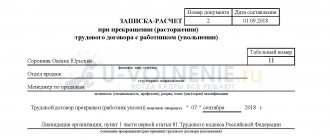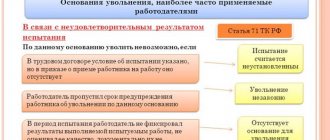Legislation
The main legislative act regulating the issues of service, employment in the Ministry of Internal Affairs, assignment of ranks, leave and dismissal is the Federal Law “On Service in the Internal Affairs Bodies”.
| Article | Description |
| Art. 80 | The grounds for termination of service may be the dismissal or death of an employee |
| Art. 81 | Dismissal is carried out through termination of the contract |
| Art. 82 | The contract is terminated on the basis of termination, the employee reaching the maximum age of service, length of service, at the initiative of the employee, by agreement of the parties, in connection with a change in the terms of the contract and the subsequent refusal of the police officer to work according to the new rules |
| Art. 84 | An employee who decides to resign must submit a corresponding report one month before the date of termination of the contract |
Important! According to the provisions of Art. 84 of the Federal Law “On Service in the Department of Internal Affairs”, if public money was spent on a citizen’s education, provided that he works in the Ministry of Internal Affairs, upon termination of the contract he is obliged to return all funds. The amount is calculated proportionally based on the remaining years he has already served. You do not need to reimburse training costs if:
- The employee cannot continue to serve in his previous position for medical reasons, and there is no possibility of transferring him to a more suitable place.
- An employee has a need for constant care for a close relative of retirement age or a disabled person of group 1 or 2. A medical and sanitary examination report must be present.
- If a police officer needs to care for a minor child whom he is raising alone.
If after one month the contract is not terminated for some reason, and the employee does not insist on this, it is considered valid under the same conditions.
Dismissal from the Ministry of Internal Affairs
- reaching the age when they retire;
- for medical reasons due to deteriorating health and inability to continue working;
- when drawing up a contract, in connection with its expiration date;
- on their own initiative and for other reasons.
This law regulates legal relations arising between employees belonging to the subordinate bodies of the Ministry of Internal Affairs in Russia. It regulates the legal relationships that arise during service and the dismissal process itself, starting with entry into the service of the internal bodies of the Ministry of Internal Affairs.
What are negative motives?
Police officers can be fired for negative reasons.
Article 58 of the Service Regulations lists the circumstances that do not allow a person to remain in law enforcement:
- the presence of a final conviction against the police officer;
- termination of a criminal case due to amnesty, reconciliation of the parties, expiration of the statute of limitations for bringing a police officer to criminal liability;
- significant disregard for labor discipline standards;
- use of false documents and false information for employment and future career advancement;
- loss of honor and dignity by an officer, committing acts that contradict the legal requirements for the moral character of an employee of internal affairs bodies;
- violation of Russian laws, regulations, instructions of the ministry;
- repeated failure to comply with discipline in the presence of a valid penalty.
Dismissal from the police (formerly the police) for negative reasons is inevitable when committing a criminal offense on the basis of a sentence that has entered into force. If the accused is placed in custody during the preliminary investigation, he will be excluded from the internal affairs bodies on the day of arrest.
The legislator considers the following to be a significant disregard for labor discipline standards:
- failure to comply with the rules for storing and using service weapons and ammunition;
- being on duty after using drugs or being intoxicated;
- absence from work without a valid reason for four hours;
- non-compliance with information storage standards;
- refusal of medical examination required by law;
- refusal to undergo mandatory certification;
- targeted destruction or damage to official property;
- carrying out illegal actions against citizens;
- violation of safety rules that triggered serious consequences - a fire, accident, injury, or provoked the threat of such consequences;
- public negative, insulting statements about members of the government, government officials at any level, and superiors;
- non-compliance with standards for working with material assets and funds;
- refusal to provide citizens with any information related to personal gain;
- non-compliance with contract provisions;
- violation of Russian legislation.
We suggest you read: Does the defendant have the right to appeal the decision of the arbitration court
? It is inevitable that an employee will be dismissed for presenting false documents for the purpose of employment or promotion. It does not matter what document we are talking about - a school certificate, a diploma of higher education, a work record book.
The task of police officers is to protect the population, legal entities from criminal attacks and comply with the law. This important mission determines a person’s personal qualities, without which service in the authorities is impossible.
Article 13 of Federal Law No. 342 of November 30, 2011 requires that an employee of internal affairs bodies, on duty and during off-duty hours, behave with dignity, without spoiling the reputation of either his own or the department as a whole. A police officer should not make decisions or take actions aimed at obtaining personal gain.
His actions must be thoughtful, selfless, and fair. The provisions of Article 82 of the above-mentioned law call dismissal the only measure of influence on an employee who has discredited his honor and dignity.
Grounds for dismissal include circumstances that led to a loss of confidence in the employee:
- simultaneously served in the police and was engaged in entrepreneurial activities;
- held a management position in a commercial company whose goal is to make a profit;
- entered false information into the income declaration, concealed the presence of an additional source of profit, property not only of his own, but also of his spouse or minor child;
- violated the law regulating the rules for storing money in foreign bank accounts (the norm applies to the spouse and minor children of a police officer);
- is a member of the board of a foreign non-profit organization operating in Russia;
- extracts self-interest and personal gain from the situation that has developed in the service;
- knows (may know) about the selfish actions and personal interests of the subordinate, but does not stop his activities.
An employee can be dismissed on such grounds only if there is direct intent, established during an internal audit or by a court verdict.
Job loss is threatened for violations of contractual obligations associated with the employee’s lack of the necessary education, failure to fulfill job duties, abuse of official position, or ignoring job descriptions.
Dismissal from the Ministry of Internal Affairs for negative reasons
Article 2.5. Administrative responsibility of military personnel and other persons subject to disciplinary regulations Employees of internal affairs bodies, (.), are responsible for administrative offenses in accordance with regulatory legal acts regulating the procedure for serving in these bodies. For violation of legislation on (.) traffic rules
.
persons who are subject to disciplinary statutes or special provisions on discipline are liable on a general basis
.
Article 2.5. Administrative responsibility of military personnel and other persons subject to disciplinary regulations Employees of internal affairs bodies, (.), are responsible for administrative offenses in accordance with regulatory legal acts regulating the procedure for serving in these bodies. For violation of the legislation on (.) traffic rules, persons who are subject to disciplinary statutes or special provisions on discipline are liable on a general basis.
When is it impossible to resign from the Ministry of Internal Affairs?
Art. 35 of the Federal Law “On Service in the Department of Internal Affairs” describes a number of reasons why an employee cannot initiate dismissal at will:
- During a designated martial law or state of emergency.
- In the event of an armed conflict or a counter-terrorist operation.
- When eliminating the consequences of an emergency.
If a police officer refuses to fulfill the terms of the contract, this is grounds for dismissal from the position being filled and dismissal from service on the basis of paragraph 13, paragraph 1 of Art. 82 Federal Law “On the Service...”.
How to resign from the Ministry of Internal Affairs: dismissal procedure
Good salaries, training opportunities, social guarantees and benefits made police service quite attractive. Having completed military service, many young people are wondering how to pass a polygraph at the Ministry of Internal Affairs and a medical examination in order to become a police officer.
If a police officer expresses a desire to work, the report is returned to him. In this case, the contract is considered extended under the same conditions. Before the dismissal order is issued, weapons and other official property are confiscated from the police officer. The employee is introduced to the dismissal order in person against signature. Payment is made on the same day. When accepting documents, a new employee will be told about how to successfully pass the CPD at the Ministry of Internal Affairs.
The procedure for dismissing an employee from internal affairs bodies
To apply for a long-service pension from law enforcement agencies, certain conditions are required. They are regulated by law.
For this there must be:
- The maximum length of service for the possibility of receiving a military pension has been developed, which is 20 years.
- The employee has reached the retirement age specified for law enforcement officers, that is, 45 years or more.
- General experience of 25 years or more, and specifically in service in the Ministry of Internal Affairs - 12.5 years minimum.
From 2011 to 2021, social protection of retired employees was provided by Federal Law No. 247. Since April 2018, some changes have been made there. They relate to increasing experience. It is expected to be increased by five years. As a result, instead of 20 people, they will serve in the Ministry of Internal Affairs for 25 years.
Employees are required to notify of resignation two months before the designated date of termination of the contract. Upon termination of employment, an employee with 20 years of service or more is entitled to a one-time payment equal to his 7 salaries for that day.
Expressing a desire to resign from the authorities, an employee has the right to undergo a military and military examination within the framework of Regulation No. 565 of the Russian Government. The conclusions of doctors will help determine the person’s health status and the possibility of further service in law enforcement agencies. The commission is called upon to determine the category of illnesses, injuries and their consequences acquired during service. Based on the doctors’ conclusion, it will be possible to outline the basis for termination of work.
We invite you to read: Exemption from paying child support when the court approves
To conduct a medical commission, you must adhere to the procedure for passing the IVC at the Ministry of Internal Affairs upon retirement:
- The IHC should be carried out 60 days before dismissal.
- Notices about the date of contract termination and medical examination are issued simultaneously.
- If the medical examination is not completed immediately, it can be completed after retirement within one year. To do this, you will have to contact the personnel service at your place of duty.
When submitting an application for dismissal, the employee must reflect in the report his desire to undergo or not undergo the IVC. But we must remember that passing the IHC upon retirement from the Ministry of Internal Affairs and the conclusions drawn by doctors can help count on disability and, accordingly, an increase in the size of the pension.
To pass the commission, you can go to the clinic at your place of residence or at a medical institution under the Ministry of Internal Affairs.
The list of certificates for registration of resignation from the bodies of the Ministry of Internal Affairs is prepared by the personnel service. And all documentation and copies thereof are transferred to the pension service of the Ministry of Internal Affairs to the employees themselves.
Documents must be examined no more than ten days from the time they are submitted. The order to terminate the employee’s labor activity is signed by the head of his internal affairs department. From the moment it is signed and the employee actually leaves service, the calculation of the long-service pension begins.
Dismissal due to an offense that discredits the honor of a police officer, malicious violation of discipline, or other negative grounds is possible only after the completion of a special internal investigation.
During the investigation, the fact of the violation, the involvement of a certain employee, and the degree of guilt are established. The conduct of an internal investigation is regulated by the provisions of the Instruction on the procedure for organizing and conducting internal audits in internal affairs bodies.
Upon completion of the inspection, a conclusion is drawn up. It takes into account the conditions under which the act was committed, its severity, the reputation of the police officer, previous merits, and awareness of guilt. The resolution indicates the qualification of the offense and the name of the penalty applied.
The employee is familiarized with the order, and, if necessary, with the conclusion and materials of the inspection. From this moment the penalty is considered imposed. Two months before dismissal from service, the employee is given a notice containing his personal data, the reason and date of dismissal, due payments, information about the performer, his signature and seal.
The document is handed over against signature. The personnel service prepares a submission from the internal affairs bodies and submits it to management for consideration. Measures are being taken to remove the employee from the federal register.
The employee is introduced to the text of the presentation. A corresponding entry is made in the work book indicating the exact period of service. Upon dismissal, the medical insurance policy remains with the employee; there is no need to hand it over.
Dismissal is a legal process that involves respecting the rights of a citizen. The employer must hand him a work book on the last working day and make the payments due, regardless of the reason for dismissal. Additionally, the employee is given
income certificate
, a certified copy of the dismissal order, medical examination reports, acts (if available).
Grounds for dismissal from internal affairs bodies (police).
Grounds for termination or termination of a contract (Article 82 of the Federal Law of November 30, 2011 No. 342-FZ “On Service in the Internal Affairs Bodies of the Russian Federation”) and dismissal of employees from the internal affairs bodies.
The contract is terminated, and the employee of the internal affairs bodies may be dismissed from service in the internal affairs bodies:
1) upon expiration of the fixed-term contract;
2) upon the employee reaching the age limit for serving in the internal affairs bodies, established by Article 88 of the Federal Law of November 30, 2011 No. 342-F3 “On service in the internal affairs bodies of the Russian Federation”
The contract may be terminated, and the employee of the internal affairs bodies may be dismissed from service in the internal affairs bodies:
1) by agreement of the parties;
2) at the initiative of the employee;
3) in connection with a change in the terms of the contract and the employee’s refusal to continue serving in the internal affairs bodies;
4) according to length of service giving the right to receive a pension;
5) in connection with the inconsistency of the employee with the position being filled in the internal affairs bodies - on the basis of the recommendation of the certification commission;
6) in connection with a gross violation of official discipline;
7) in connection with repeated violations of official discipline if the employee has a disciplinary sanction imposed in writing by order of the head of the federal executive body in the field of internal affairs or an authorized manager;


9) in connection with the reinstatement of an employee who previously filled this position in the internal affairs bodies (in the event that the employee filling this position refuses to be transferred to another position in the internal affairs bodies);
10) in connection with expulsion from an educational institution of higher professional education by the federal executive body in the field of internal affairs;
11) in connection with the reduction of a position in the internal affairs bodies, replaced by an employee;
12) due to the expiration of the employee’s tenure at the disposal of the federal executive body in the field of internal affairs, its territorial body or division;
13) in connection with the refusal of an employee, without good reason, to serve in special conditions in accordance with Part 1 of Article 35 of the Federal Law of November 30, 2011 No. 342-FE “On Service in the Internal Affairs Bodies of the Russian Federation”;
14) in connection with the employee’s refusal to be transferred to a lower position in the internal affairs bodies in order to execute a disciplinary sanction;
15) due to violation of the terms of the contract by the employee;
16) in connection with violation of the terms of the contract by an authorized manager;
17) at the initiative of the employee;
18) in connection with the transfer of an employee to another type of civil service;
19) in connection with the appointment of an employee to a government position in the Russian Federation;
20) due to the employee’s failure to comply with the restrictions and prohibitions established by federal laws;
21) in connection with the termination of an employee’s access to information constituting state and other secrets protected by law, if the performance of official duties requires access to such information;
22) due to loss of trust.
In addition, the contract is subject to termination, and the employee of the internal affairs bodies is subject to dismissal from service in the internal affairs bodies:
1) in connection with illness - on the basis of the conclusion of a military medical commission about unfitness for service in internal affairs bodies;
2) in connection with the recognition of an employee as incompetent or partially capable by a court decision that has entered into legal force;
3) due to the impossibility of transfer or the employee’s refusal to transfer to another position in the internal affairs bodies;
4) in connection with the termination of citizenship of the Russian Federation or the acquisition of citizenship (nationality) of a foreign state;
5) in connection with the submission by an employee of forged documents or deliberately false information when entering service in the internal affairs bodies, as well as in connection with the submission by an employee of forged documents or deliberately false information during his service in the internal affairs bodies, confirming his compliance with the requirements of the legislation of the Russian Federation Federation in terms of the conditions for filling the corresponding position in the internal affairs bodies, if this does not entail criminal liability;
6) in connection with an employee’s refusal to transfer to another position in the internal affairs bodies in order to eliminate circumstances related to the direct subordination or control of employees who are in a relationship of close kinship or affinity, in accordance with the legislation of the Russian Federation;
7) in connection with the conviction of an employee for a crime, as well as in connection with the termination of criminal prosecution against the employee due to the expiration of the statute of limitations, in connection with the reconciliation of the parties, as a result of an amnesty act, in connection with active repentance;


9) in connection with the commission of an offense that discredits the honor of an employee of the internal affairs bodies;
10) in connection with the employee’s violation of mandatory rules when concluding a contract;
11) due to the expiration of the period established by Part 5 of Article 37 of this Federal Law for the resumption of service in internal affairs bodies;
12) in connection with an employee’s refusal without good reason to be transferred to an equivalent position in the rotation order.
An employee of internal affairs bodies is subject to dismissal due to loss of confidence in the following cases:
1) failure to take measures to prevent and (or) resolve a conflict of interest to which he is a party;
2) failure by the manager (supervisor), who became aware that a subordinate employee has a personal interest that leads or may lead to a conflict of interest, to take measures to prevent and (or) resolve conflicts of interest;
3) failure by an employee of the internal affairs bodies to provide information about his income, property and property-related obligations, as well as about the income, property and property-related obligations of his spouse and minor children, or the provision of knowingly false or incomplete information;
4) participation of an employee on a paid basis in the activities of the management body of a commercial organization, except for cases established by federal law;
5) the employee carries out entrepreneurial activities;
6) entry of an employee into the management bodies, trustee or supervisory boards, other bodies of foreign non-profit non-governmental organizations and their structural divisions operating on the territory of the Russian Federation, unless otherwise provided by an international treaty of the Russian Federation or the legislation of the Russian Federation.
Is there a pension?
Upon dismissal from the internal affairs bodies or the army, a statement is drawn up with a mandatory indication of the reason for dismissal, length of service, benefits and social guarantees.
Leaving service for negative reasons if you have the required length of service does not affect the assignment of a long-service pension.
An exception to this rule occurs when, before a pension is granted, an employee is found guilty of committing a crime and, as a punishment, is deprived of a special rank. If at the time of dismissal the length of service has been partially earned, then the right to receive a pension does not arise.
It is not permitted to terminate the payment of an already earned long-service pension due to deprivation of a special rank for a crime committed after leaving law enforcement service. This is confirmed by judicial practice and decisions of the Constitutional Court.
Retirement from the Ministry of Internal Affairs: passing the military examination, paperwork
The personnel service of a military unit records dismissal from the Ministry of Internal Affairs based on length of service that gives the right to receive a pension, and determines what documents the former employee will have to provide for pension registration.
Please note: It is not a prerequisite to have the number of years of work established by law if an employee is diagnosed with a disability, or if he is injured, or if he acquires a disease while in public service.
We recommend reading: Validity of a Car Seizure by Bailiffs
Is it possible to quit without working?
https://www.youtube.com/watch?v=J5FJtUUmgC8
Employees of the Ministry of Internal Affairs are subject to the provisions of the Federal Law “On Service in the Department of Internal Affairs”, and not the norms of the Labor Code of the Russian Federation, where, upon dismissal on their own initiative, an employee is necessarily exempt from two weeks of service if there are good reasons (enrollment in an educational institution, relocation, etc.).
Here it is important to comply with one condition specified in paragraph 4 of Art. 84 Federal Law No. 342-FZ: before the expiration of the mandatory service period, an employee may be dismissed with the permission of the manager.
There is another option - termination of the contract by agreement of the parties (Article 83 of the Federal Law “On Service”), where a specific date for leaving service will be indicated in advance.
We suggest you read: You can live under temporary registration before purchasing an apartment
Procedure for dismissal from the Ministry of Internal Affairs
If an employee serves in the Ministry of Internal Affairs of Russia in the positions of ordinary and commanding personnel, then his dismissal from service is regulated by the Law of the Russian Federation “On the Police”. If a citizen works in the system of the Ministry of Internal Affairs of Russia in civilian positions, then when dismissing him from work, he must be guided by the Labor Code of the Russian Federation.
Meanwhile, there are many who want to leave the police service. The reasons may be different: for health reasons, for reaching the age limit (retirement). moving to another job. Sometimes dismissal is difficult because it requires reimbursing the employee's training costs. Or termination of service may be due to negative certification results. But, in any case, every employee should know how to resign from the Ministry of Internal Affairs legally.
Appeal against termination of employment relationship
The decision to dismiss for negative reasons can be challenged in court.
- bringing an employee to disciplinary action while on sick leave;
- violation of deadlines for issuing a penalty or dismissal;
- non-compliance with the methodology for performing an internal audit, the dismissal procedure and the rules for drawing up related documents;
- management’s reluctance to familiarize the dismissed employee with all the materials of the audit conducted against him;
- disciplinary action is not commensurate with the gravity of the act.
A statement of claim must be filed with the court at the location of the employer, containing information about the applicant and the defendant, and the reasons for disagreement with the dismissal. It is advisable to attach supporting documents to the document. The period for appealing the manager’s illegal decision to dismiss for negative reasons is one month. The period is calculated from the date of receipt of the order.
Dear readers, the information in the article may be out of date, please take advantage of a free consultation by calling: Moscow, St. Petersburg or using the feedback form below.
Compensations and payments upon dismissal from the Ministry of Internal Affairs at one's own request
| View | Description |
| One-time benefit | With 20 or more years of service - 7 salaries, less than 20 years - 2 salaries |
| Salary | Calculated in proportion to time worked |
| Quarterly bonus | |
| Compensation for vacation days not taken off | Depends on the number of days of rest |
| Award for conscientious performance of official duties | Based on the results of work for the year in which the dismissal is made |
Dismissal from the Ministry of Internal Affairs
The plaintiff was familiarized with the notice of dismissal, the text of the certification and the notice of attendance at the meeting of the certification commission on November 11, 2021, but refused to sign the familiarization, as evidenced by the act dated November 8, 2021. The authenticity of the act at the court hearing was confirmed by witness FULL NAME8 - one of the participants in its preparation and an eyewitness to the plaintiff’s familiarization with the specified documents.
Hello dear lawyers. Please tell me if previously, upon dismissal of an employee of the Ministry of Internal Affairs, payment was due for 15-20 years of service - 15 salaries, 20-25 years - 20 salaries, and depending on the article of dismissal - 40% of the indicated amounts. What about now? Before 20 years - 2 salaries, after 20 - 7 salaries, and under what circumstances are 40% of the above amounts paid? Thank you in advance. Sincerely, Vladimir.
Common Mistakes
Mistake #1. You can terminate the contract at your own request without completing the required period, if there are good reasons
Termination of the contract is carried out on a general basis, and the presence of valid reasons is not provided for here.
Mistake #2. You can resign from the Ministry of Internal Affairs on a specific date only by agreement of the parties.
No, there are two options here. In the first, after the expiration of the notice period, the employee has the right to resign, and in the second, he has the right to agree with the boss on early dismissal.
How to resign from the Ministry of Internal Affairs: dismissal procedure
#4 Dismissal does not always occur at the request of the police officer. If he violates labor discipline or commits a disciplinary offense, management may begin the dismissal procedure. First, an internal check is carried out. It must be objective. Based on its results, a conclusion on punishment is made. The hardest thing is dismissal. Before the expiration of 2 months, the employee must be dismissed. Most likely, he will no longer need information about how to enroll in the Ministry of Internal Affairs school and under what conditions.
We recommend reading: What Benefits Does a Single Mother Have in 2021 Who Gave Birth to a Third Child in N Novgorod
#2 It is known that every police officer enters into a contract with the Ministry of Internal Affairs for a certain period. If you wish, you can resign before the expiration of this document. To do this, the police officer must write a report 30 days before the expected date of dismissal. By the way, during this period the employee has the right to withdraw his report. If the report is not withdrawn, then management issues an order of dismissal. The vacancy becomes vacant and the new applicant will be explained how to take a polygraph at the Ministry of Internal Affairs and collect other documents.
FAQ
Question No. 1. Is it possible to resign while on a business trip to the Investigative Committee?
The Investigative Committee in this case is not the main place of work, therefore, in order to be dismissed, you must submit a report to your immediate management. You can terminate the contract because a business trip to the TFR is not service under martial law.
Question No. 2. What to do if the employee is not fired after the mandatory service period has expired?
He has the right not to go to work, but full payment must be made to him on the last day of his work. If this condition is not met, he can go to court or try to resolve everything peacefully.
How to write a report on dismissal from the Ministry of Internal Affairs at your own request
- expiration of military service. At the same time, in any case, you need to write a report on dismissal at the end of the contract! This is a clear example of a difference from ordinary labor law. In normal cases, if a fixed-term contract is drawn up, then at the end of its validity period it is automatically terminated and the employment relationship between the employee and the employer is terminated. For the Ministry of Internal Affairs, a report on dismissal is still required;
- according to length of service. If the person being dismissed has accumulated the necessary length of service for a military pension or has reached a certain age, after which he does not have the right to work in such a position. The standard age limit for regular positions for men is 65 years;
- health status. To do this, you need an official conclusion from a medical institution confirming that the employee is not fit for military service;
- in connection with deprivation of a military rank (this is possible due to the entry into force of a court verdict against a serviceman, loss of trust from senior management, etc.);
- dismissal for non-compliance with the terms of the contract. In this case, non-compliance with the conditions is possible both on the part of the serviceman and on the part of the command. A clear example of non-compliance with the rules by a military personnel: internal regulations were violated or an employee left the Russian Federation without the permission of the commander. In any case, these must be either very serious violations or systematic ones (at least 2 times, but the punishment for the same offense twice is not taken into account). Violation of the terms of the contract is also possible on the part of the command. The most common situation is the lack of payment of required allowances and bonuses (which are provided for in the contract). But before writing a resignation letter, the employee must try to resolve this situation, set out in writing the complaints and his version of resolving the situation. If this does not produce results, then he has the right to submit a report for dismissal.
So, if a police officer, an employee of the Ministry of Internal Affairs or the Federal Penitentiary Service of his own free will wants to resign, then no special problems arise. But this is only provided that the person has reached a certain age or was not working under a contract. If the contract has expired, he can also quite easily simply leave the service at will. But if it is decided to terminate the contract early, then the dismissal procedure will be slightly different. It involves the following steps:









